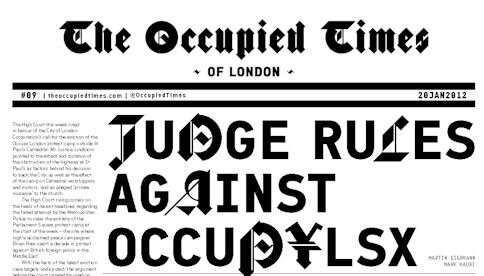As Britain enters its fourth year of ever-deepening austerity measures since the onset of the global financial crisis, the sails of the good ship Westminster seem primed to catch only the breath of economic tradition – of unwavering fidelity to the City, unchecked ‘free trade’ and a blind eye towards tax injustice. And on Wednesday, the proponents of the status quo received yet another boost.
Fast approaching the 100-day anniversary of activists’ occupancy of grounds outside St. Paul’s Cathedral, the British High Court paid further homage to the City of London Corporation – an archaic governing institution unknown to much of the British public and a powerful lobby for London’s financial sector – granting them the right to evict the Occupy London camp.
Needless to say, we are deeply disappointed with the ruling. While we respect the authority of the High Court and Judge Lindblom, we sincerely disagree with the assessment that the camp has failed to maintain safety and sanitation, and that an eviction does not “impose excessive burden” on our right to free speech and freedom of assembly. As the judge himself stated, the tents are “intrinsic to the protest.” We thus do not accept the logic that a wholesale eviction of the camp represents the “least intrusive” approach and that it does not interfere significantly with our right to articulate an alternative vision for our society which presents a challenge to the social, economic and environmental injustices at the heart of the method of social orchestration under global scrutiny by us: the 99%.
While the Judge has positively commented on the motivations and conduct of the protesters, his ruling effectively terminates our presence at St. Paul’s and goes far beyond the restrictions of fundamental rights allowed under the European Convention of Human Rights.
This ruling, to us, highlights the discrepancy between legality and justice. Even if one were to accept the High Court’s decision that an eviction would be covered by the scope of the law and represents a “necessary and proportionate” restriction of our right to protest, the ruling fails to state anything about the justice of such an action. In practice, the right to protest has repeatedly been curbed by parliament and sanctioned by UK courts; the ban on protests in the vicinity of the Houses of Parliament is only the most recent example of this long-term trend.
Still, we are not resigning. Over the past several months, the Occupy movement has outgrown its particular localities. It has become, in the best sense of the word, a global movement. We are confident that the appeal process will yield a different ruling and reserve the High Court’s miscarriage of justice. But in a way, the ruling has become secondary to the mission. You simply cannot evict an idea whose time has come. As co-defendent George Barda put it: “If this movement is really about how we want to live in the future, it is not down to one camp or fifty camps. We will move into communities, we need to have conversations with more of the 99%.”
In the US, Occupy has already moved into neighbourhoods. Since Zuccotti Park was evicted on November 15th last year, Occupy activists have taken the protest to neighborhoods around the city, reinstating evicted tenants into abandoned homes. Here in London, the Occupy movement has already coordinated with student protesters and the “Sparks” demonstrations. We firmly believe that these processes must continue. The concerns of the Occupy movement are the concerns of a broad cross-section of society. They transcend each particular camp and touch upon the livelihood and everyday experiences of the 99%.
For too long, policies that favored the rich and powerful have remained uncontested. We have too easily accepted neoliberal policies as inevitable, and Labour compromises as necessary. Recent determination by Westminster to bite into values such as disability living allowance serves to underscore the unyielding preference afforded to the City, and the failure of a progressive Left to articulate an alternative to corporate rule. This is the cause that brought the Occupy movement into existence, and it is the reason the movement continues to exist and grow.
Anyone who doubts our conviction and tenacity should have been at the General Assembly after the High Court’s decision. Despite the disappointing outcome, the mood was positive and defiant. After three months at St. Paul’s, after many discussions, countless workshops and an abundance of lectures, we can decidedly say: We have had an impact on society and on politics. And in the process, we have had an impact on each other. We have educated each other, and have helped to educate society in turn. We have put inequality back on the political agenda. It is not surprising that Wednesday’s General Assembly closed with a song. Through the London night, the sound echoed from the walls of St. Paul’s: “The higher you build your barriers, the higher I become. … There’s something inside so strong. … Something inside so strong.”

